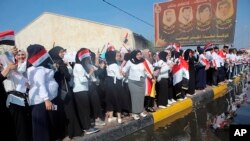Thousands of students joined Iraq's anti-government protests on Monday, as clashes with security forces firing tear gas canisters killed at least three demonstrators and wounded more than 100.
The students skipped classes at several universities and secondary schools in Baghdad and across Iraq's majority-Shiite south on Monday to take part in the protests, despite the government ordering schools and universities to operate normally.
One of those killed was a 22-year-old female medical student, the first woman to be killed since the protests began earlier this month. Seventeen students were among the wounded.
Authorities later announced a curfew from midnight to 6 a.m. in the capital, as renewed protests there and across the south raged for a fourth day. A senior security official estimated that 25,000 protesters took part in the demonstration in the capital.
In a separate development, three rockets struck a large military base north of Baghdad that houses U.S. and Iraqi forces, according to another senior Iraqi security official. The official said there were no casualties, and that the attack is being investigated. Both officials spoke on condition of anonymity because they were not authorized to brief reporters.
The demonstrations are fueled by anger at corruption, economic stagnation and poor public services. Despite its vast oil wealth, Iraq suffers from high unemployment and crumbling infrastructure, with frequent power outages that force many to rely on private generators.
On Monday, parliament voted to cancel all privileges and bonuses for the president, the prime minister, the Cabinet, parliament members and other senior officials. But lawmakers later pointed out that the move was unlikely to be implemented because the legislature did not actually amend the law governing such matters.
In any case, the move seemed unlikely to satisfy the protesters, who are calling for far more sweeping change.
"It's a student revolution, no to the government, no to parties!" demonstrators chanted in Baghdad's Tahrir Square, the epicenter of the protests. Protesters have camped out in the central roundabout and volunteers have brought them food, hoping to recreate the revolutionary atmosphere of similar rallies held across the region during and after the 2011 Arab Spring.
"We are protesting in solidarity with peaceful demonstrators against this corrupt government, the government that created divisions in Iraqi society and supported the rich at the expense of the poor," said Sajad Ali, a high school student. "We demand the resignation of this government."
Security forces have fired tear gas and stun grenades to keep protesters from crossing a main bridge leading to the Green Zone, home to government offices and embassies.
At least 72 protesters have been killed since nationwide anti-government protests resumed on Friday, after 149 were killed during an earlier wave of protests this month.
Iraqi security and medical officials confirmed the latest casualties on Monday. The officials spoke on condition of anonymity because they were not authorized to talk to media.




